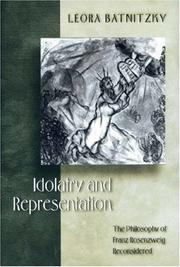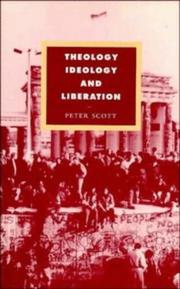| Listing 1 - 6 of 6 |
Sort by
|
Book
ISBN: 9789085064114 9085064112 Year: 2007 Volume: *9 Publisher: Amsterdam SUN
Abstract | Keywords | Export | Availability | Bookmark
 Loading...
Loading...Choose an application
- Reference Manager
- EndNote
- RefWorks (Direct export to RefWorks)
Religious studies --- Semiotics --- Afgodendienst --- Afgoderij --- Dieu (Judaïsme) --- God (Jodendom) --- God (Judaism) --- Godenbeelden en godsdienstige afbeeldingen --- Iconografie --- Iconographie --- Iconography --- Idolatrie --- Idolatry --- Idols and images --- Idolâtrie --- Représentations divines et images religieuses --- icoon --- Academic collection --- 291.218 --- Goden: afbeeldingen van de godheden. Idolatrie --- 291.218 Goden: afbeeldingen van de godheden. Idolatrie --- Icons --- Cult --- History of doctrines --- departement Beeldende Kunst 08 --- iconen --- godsdienst --- symbolen
Book
ISBN: 0333539826 Year: 1994 Volume: *1 Publisher: London Macmillan
Abstract | Keywords | Export | Availability | Bookmark
 Loading...
Loading...Choose an application
- Reference Manager
- EndNote
- RefWorks (Direct export to RefWorks)
Afgodendienst --- Afgoderij --- Conscience nationale --- Consciousness [National ] --- Filosofie [Marxistische ] --- Identity [National ] --- Idolatrie --- Idolatry --- Idolâtrie --- Marxian philosophy --- Marxism --- Marxisme --- Marxist philosophy --- Marxistische filosofie --- Nationaal bewustzijn --- Nationaal gevoel --- National consciousness --- National identity --- Nationalism --- Nationalisme --- Philosophie marxiste --- Philosophy [Marxist ] --- Sentiment national --- 316:2 --- #SBIB:316.331H600 --- #SBIB:321H30 --- Godsdienstsociologie --- Secularisatie: algemeen --- Hedendaagse politieke en sociale theorieën (vanaf de 19de eeuw): algemeen (incl. utilitarisme, burgerschap) --- 316:2 Godsdienstsociologie --- Humanism --- 20th century

ISBN: 0691048509 0691144273 1400823587 9786612767012 1282767011 1400810930 9781400810932 9781400823581 6612767014 9780691048505 9781282767010 9780691144276 1400800382 1400800390 Year: 2010 Publisher: Princeton, N.J. Princeton University Press
Abstract | Keywords | Export | Availability | Bookmark
 Loading...
Loading...Choose an application
- Reference Manager
- EndNote
- RefWorks (Direct export to RefWorks)
Although Franz Rosenzweig is arguably the most important Jewish philosopher of the twentieth century, his thought remains little understood. Here, Leora Batnitzky argues that Rosenzweig's redirection of German-Jewish ethical monotheism anticipates and challenges contemporary trends in religious studies, ethics, philosophy, anthropology, theology, and biblical studies. This text, which captures the hermeneutical movement of Rosenzweig's corpus, is the first to consider the full import of the cultural criticism articulated in his writings on the modern meanings of art, language, ethics, and national identity. In the process, the book solves significant conundrums about Rosenzweig's relation to German idealism, to other major Jewish thinkers, to Jewish political life, and to Christianity, and brings Rosenzweig into conversation with key contemporary thinkers. Drawing on Rosenzweig's view that Judaism's ban on idolatry is the crucial intellectual and spiritual resource available to respond to the social implications of human finitude, Batnitzky interrogates idolatry as a modern possibility. Her analysis speaks not only to the question of Judaism's relationship to modernity (and vice versa), but also to the generic question of the present's relationship to the past--a subject of great importance to anyone contemplating the modern statuses of religious tradition, reason, science, and historical inquiry. By way of Rosenzweig, Batnitzky argues that contemporary philosophers and ethicists must relearn their approaches to religious traditions and texts to address today's central ethical problems.
Afgodendienst --- Afgoderij --- Filosofie [Joodse ] --- Idolatrie --- Idolatry --- Idolâtrie --- Jewish philosophy --- Joodse filosofie --- Philosophie juive --- Philosophy [Jewish ] --- Judaism --- -Philosophy, Jewish --- Jews --- Philosophy, Jewish --- Philosophy, Israeli --- Religions --- Semites --- Idols and images --- Doctrines --- Philosophy --- Religion --- Worship --- Rosenzweig, Franz --- Idolatry. --- Jewish philosophy. --- Doctrines. --- Rosenzweig, Franz, --- Jewish theology --- Theology, Jewish --- Rozentsṿaig, Frants, --- Rozentsṿaig, F. --- Rozentsṿig, Frants, --- Rozenzweig, Franz, --- רוזנזוויג, פרנץ --- רוזנצוויג, פראנץ, --- רוזנצוויג, פרנץ --- רוזנצוויג, פרנץ, --- רוזנצווייג, פראנץ --- רוזנצווייג, פראנץ, --- רוזנצווייג, פרנץ --- רוזנצווייג, פרנץ, --- רוזנצויג, פרנץ, --- רוזנצוייג, פרנץ,
Book
ISBN: 2207231755 9782207231753 Year: 1985 Publisher: Paris Denoel
Abstract | Keywords | Export | Availability | Bookmark
 Loading...
Loading...Choose an application
- Reference Manager
- EndNote
- RefWorks (Direct export to RefWorks)
Judaism --- Judaïsme --- Congresses --- Congrès --- Idols and images --- Gods in rabbinical literature --- Biblical teaching --- 291.218 --- -Idols and images --- -Judaism --- -#GOSA:XV.Jod.M --- Jews --- Religions --- Semites --- Iconography --- Images and idols --- Religious images --- Statuettes --- Animism --- Art, Primitive --- Art and religion --- Fetishism --- Magic --- Religion --- Sculpture, Primitive --- Symbolism --- Gods in art --- Rabbinical literature --- Goden: afbeeldingen van de godheden. Idolatrie --- -Congresses --- 291.218 Goden: afbeeldingen van de godheden. Idolatrie --- Judaïsme --- Congrès --- #GOSA:XV.Jod.M --- Biblical teaching&delete& --- Idolatrie / et Judaïsme. (Congrès) --- Afgoderij / en Jodendom. (Congres) --- Iconography, Religious --- Religious iconography --- Religious statuettes --- Statuettes, Religious --- Religious art --- Judaism - Congresses --- Idols and images - Biblical teaching - Congresses --- Gods in rabbinical literature - Congresses

ISBN: 0521464765 0521072298 0511896085 Year: 1994 Publisher: Cambridge Cambridge University press
Abstract | Keywords | Export | Availability | Bookmark
 Loading...
Loading...Choose an application
- Reference Manager
- EndNote
- RefWorks (Direct export to RefWorks)
How is theology liberating? In the context of a post-Gorbachev world, where many demand freedom which the Western powers seem ill-equipped to deliver, is it even possible to envisage a liberative theology? Taking as his starting point the Marxist complaint that Christianity is ideological, Peter Scott argues that it is not enough for Christian theology to talk about liberation: it must be liberative. Stressing with feminist and liberation theologies the embodied, contextual nature of theology, the constructive proposal made here locates God's liberating abundance toward society in an interpretation of resurrection as social. Only in this way, in the author's view, can a trinitarian Christian account of liberation be adequately grounded. The book will be of interest to all those who wish to know if theology may speak truthfully about the transformation of society: it offers the shape of a liberative theology pointing towards social freedom.
241.1*31 --- Sociology, Christian --- Idolatry --- Ideology --- -Liberation theology. --- Theology of liberation --- Christian social theory --- Social theory, Christian --- 241.1*31 Politieke theologie. Bevrijdingstheologie. Ethiek van de revolutie --- Politieke theologie. Bevrijdingstheologie. Ethiek van de revolutie --- Religious aspects --- -Christianity --- Afgodendienst --- Afgoderij --- Christelijke sociologie --- Idolatrie --- Idolâtrie --- Sociologie [Christelijke ] --- Sociologie chrétienne --- Sociology [Christian ] --- Christian sociology --- Liberation theology --- Idols and images --- Theology, Doctrinal --- Kairos documents --- Philosophy of liberation --- Knowledge, Theory of --- Philosophy --- Political science --- Psychology --- Thought and thinking --- Sociology --- Religious aspects&delete& --- Christianity --- Worship --- Ideology - Religious aspects - Christianity. --- Arts and Humanities --- Religion --- Christian sociology. --- Idolatry. --- Liberation theology. --- Christianity.
Book
ISBN: 9789089649898 9089649891 9789085284253 9789048529797 9789048529803 9085284252 9048529794 9048529808 9784048529797 Year: 2017 Publisher: Antwerpen Halewijn
Abstract | Keywords | Export | Availability | Bookmark
 Loading...
Loading...Choose an application
- Reference Manager
- EndNote
- RefWorks (Direct export to RefWorks)
Inleiding tot de ontstaansgeschiedenis en de inhoud van de Koran.
217.2 --- Koran --- islam --- #KVHA:Godsdienst --- #KVHA:Islam --- #KVHA:Koran --- 297.181 --- 297.181 Islam: canonieke boeken; Koran --- Islam: canonieke boeken; Koran --- Islam --- Godsdiensten --- Heilige geschriften --- de Koran --- Mohammed --- de profeet Mohammed --- de Openbaring --- de Traditie --- Kitab --- Mushaf --- geschiedenis van de samenstelling van de Koran --- de structuur van de Koran --- de soera's --- bismillah --- literaire genres --- de Arabische taal --- poëzie --- Mekka --- stammen en clans --- geloofsovertuigingen --- Medina --- Jathrib --- Mohammeds actie in Medina --- de veldslagen van Mohammed --- Mohammed en Abraham --- Mohammed en de Christenen --- de Koran en het geweld --- gewelddadig discours --- de 'compenserende vergelding' --- marterlaarschap --- afvalligheid --- de 'jihad' --- het 'vers van het Zwaard' --- kruisiging en afhouwen van handen en voeten --- de islam --- juridische bepalingen in de Koran --- de shari'a --- de plaats van de vrouw --- het Woord Gods --- mensentaal --- afgoderij --- metaforisch taalgebruik --- openheid, kritiek en geloof
| Listing 1 - 6 of 6 |
Sort by
|

 Search
Search Feedback
Feedback About UniCat
About UniCat  Help
Help News
News